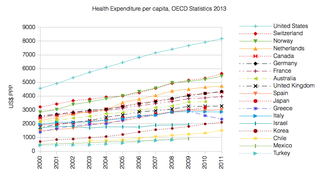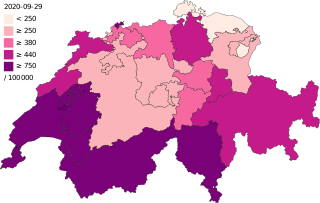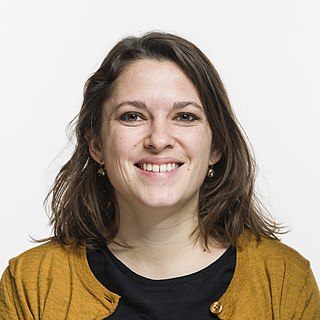Related Research Articles

Kaspar Villiger is a Swiss businessman, politician and former member of the Swiss Federal Council (1989–2003).

Flavio Cotti was a Swiss politician who served as member of the Federal Council from 1986 to 1999. He was a member of the Christian Democratic People's Party from the canton of Ticino. In the 1990s, Cotti led the Swiss government's unsuccessful attempts to further Switzerland's political integration into the European Union. He was President of the Confederation in 1991 and 1998 and headed the departments of Home Affairs and Foreign Affairs.

Schweizer Fernsehen is the German-language division of SRG SSR, in charge of production and distribution of television programmes in Switzerland for German-speaking Switzerland. It has its head office in Zürich. Its most viewed programme is Tagesschau (news), daily at 7:30 pm.

Alain Berset is a Swiss politician who has served as a Member of the Swiss Federal Council since 2012. A member of the Social Democratic Party (SP/PS), he has headed the Federal Department of Home Affairs since he took office. Berset has served as Vice President of Switzerland since 1 January 2022 under President Ignazio Cassis.

The healthcare in Switzerland is universal and is regulated by the Swiss Federal Law on Health Insurance. There are no free state-provided health services, but private health insurance is compulsory for all persons residing in Switzerland.
Swiss Standard German, or Swiss High German, referred to by the Swiss as Schriftdeutsch, or Hochdeutsch, is the written form of one of four official languages in Switzerland, besides French, Italian and Romansh. It is a variety of Standard German, used in the German-speaking part of Switzerland and Liechtenstein. It is mainly written, and rather less often spoken.

The Conservative Democratic Party of Switzerland was a political party in Switzerland from 2008 to 2020. After the 2019 general election, the BDP had three members in the National Council.
The Swiss Film Award is the national film award of Switzerland, first given out in 1998.
Kurds in Switzerland are residents in Switzerland of full or partial Kurdish origin.

Der grosse Sommer is a Swiss-German language film that was released in Switzerland on 28 January 2016. Produced partly in Japan, it is the last film starring Mathias Gnädinger.

Monique Schwitter is a Swiss writer and actress.
HeiQ is HeiQ Group. The mother company of the group is a Swiss specialty chemistry company, HeiQ Materials AG, headquartered in Zurich, Switzerland. It was founded in 2005 as a spin-off of Swiss Federal Institute of Technology Zurich (ETH).

Ignazio Daniele Giovanni Cassis is a Swiss physician and politician who has served as President of the Swiss Confederation since 1 January 2022. A member of FDP.The Liberals, he has been a Member of the Swiss Federal Council since 1 November 2017. Cassis was elected to the Federal Council on 20 September 2017 following the resignation of Didier Burkhalter. He has headed the Federal Department of Foreign Affairs since he took office. On 8 December 2021, Cassis was elected President of the Swiss Confederation for 2022.

Patrizia Laeri is a Swiss business journalist and program host.

The COVID-19 pandemic in Switzerland is part of the worldwide pandemic of coronavirus disease 2019 caused by severe acute respiratory syndrome coronavirus 2. The virus was confirmed to have spread to Switzerland on 25 February 2020 when the first case of COVID-19 was confirmed following a COVID-19 pandemic in Italy. A 70-year-old man in the Italian-speaking canton of Ticino which borders Italy, tested positive for SARS-CoV-2. The man had previously visited Milan. Afterwards, multiple cases related to the Italy clusters were discovered in multiple cantons, including Basel-City, Zürich, and Graubünden. Multiple isolated cases not related to the Italy clusters were also subsequently confirmed.

Bärbel-Maria Kurth is a German statistician and epidemiologist. From 1998 to 2019, she headed the Department of Epidemiology and Health Monitoring at the Robert Koch Institute in Berlin. In 1998, she initiated the first nationwide health survey. Subsequently, she and her department established a continuous health monitoring system for Germany.

COVID-19 vaccination in Switzerland is an ongoing immunization campaign against severe acute respiratory syndrome coronavirus 2 (SARS-CoV-2), the virus that causes coronavirus disease 2019 (COVID-19), in response to the ongoing pandemic in the country.

Mattea Julia Meyer is a Swiss politician, a member of the Swiss National Council and co-president of the Swiss Social Democratic Party.
A notifiable disease is one which the law requires to be reported to government authorities. In Switzerland, the Federal Office of Public Health is in charge of tracking the notifiable diseases.

Federal referendums were held in Switzerland on 13 February 2022, with future votes scheduled for 15 May, 25 September and 27 November. Swiss referendums take three forms: popular initiatives, which are citizen proposals to create a new law and require 100,000 valid signatures on a petition to get on the ballot; facultative or optional referendums, which are citizen proposals to approve or reject a piece of existing law and require 50,000 valid signatures on a petition to get on the ballot; and mandatory referendums, which are required to revise the constitution, join an international organization or introduce emergency federal legislation for over a year.
References
- 1 2 Sven Altermatt (27 March 2020). "Daniel Koch, unser Corona-Krisenmanager beim Bund – kurz vor der Pension". tagblatt.ch. Retrieved 1 April 2020.
- ↑ Katy Romy (26 February 2020). "Er ist die Ruhe im Corona-Sturm - aber nicht nur beliebt". swissinfo. Retrieved 1 April 2020.
- ↑ "Abteilung Übertragbare Krankheiten". Bundesamt für Gesundheit (BAG). Archived from the original on 18 March 2020. Retrieved 1 April 2020.
- ↑ "Neuer Leiter der Abteilung Übertragbare Krankheiten des BAG" (in German). Bundesamt für Gesundheit (BAG). 31 March 2020. Retrieved 1 April 2020.
- ↑ "Abschied von «Mr. Corona» - Hatten Sie nie Zweifel, Daniel Koch?". Schweizer Radio und Fernsehen (SRF) (in German). 28 May 2020. Retrieved 26 October 2020.
- ↑ "10 Dinge, die wir an Daniel Koch vermissen werden". Schweizer Illustrierte (in German). Retrieved 26 October 2020.
- ↑ "Der neue «Mister Corona» Stefan Kuster tritt nach kurzer Zeit bereits wieder zurück". Aargauer Zeitung (in Swiss High German). Retrieved 26 October 2020.
- ↑ Adrian Müller (5 March 2020). "Das Gesicht der Krise – so tickt «Mr. Coronavirus» Daniel Koch". watson.ch. Retrieved 1 April 2020.
- ↑ Nico Menzato (26 February 2020). "Daniel Koch: Dieser Mann schützt die Schweiz vor Coronavirus". watson.ch. Retrieved 1 April 2020.